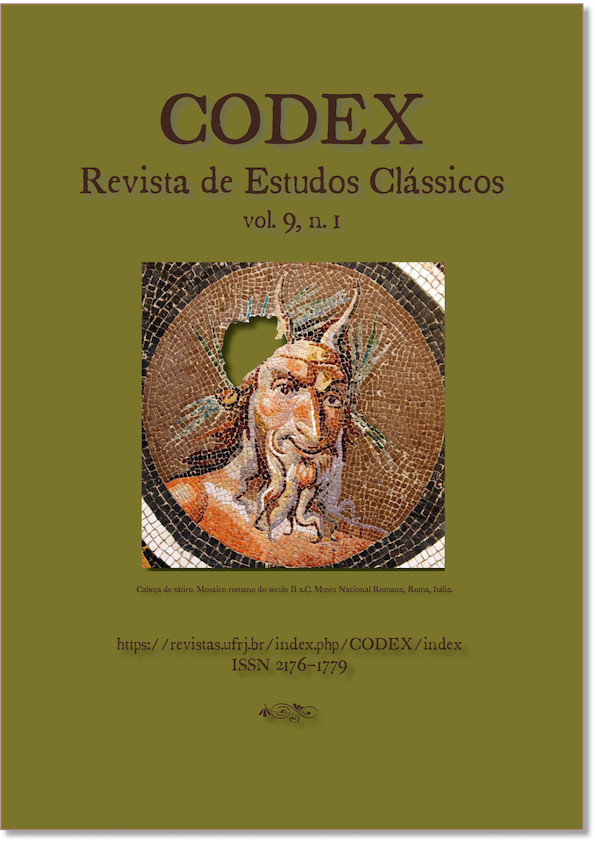Heraclitus of Ephesus: On sleep, wakefulness and death
DOI:
https://doi.org/10.25187/codex.v9i1.34126Keywords:
sleep, wakefulness, death, soul, LogosAbstract
This paper aims to do a study about the relations between theories on sleep, wakefulness and death, Logos and soul in Heraclitus. According to the Ephesian, man is in touch with death when he sleeps, because the burning of his soul, composed of fire, decreases. Whoever sleeps resembles one who is dead, due to the fact that sleeping is an intermediate state between the waking life and death. For this paper we established three instances of research that sought to elucidate the relationship between soul, Logos, sleep, death and wakefulness. From the fragments that remained, firstly we tried to understand what Heraclitus described as sleep, death and wakefulness, as well as the relationship between these states. Secondly, we needed to delineate the conception of soul proposed by the philosopher. This step was essential to the proposed research, because it revealed a possible connection of man with the fire that constitutes everything and could validate the idea that, for Heraclitus, man is part of a whole. Having established this relation between man and the existing whole, made explicit by the description of his soul, which sometimes burns, and sometimes diminishes in ardor. In a third part of the text, it was possible to think about the conception of Logos to reinforce, at the end of the study, that the Heraclitus’s theories about the relations between sleep, death and wakefulness are a part of a philosophy that unites his ideas about the human life with his theories about everything that exists.
References
ARISTÓTELES. De caelo. In.: The complete works to Aristotle. Edição de Jonathan Barnes. Princenton: Princenton University Press, 1995.
BARNES, J. Filósofos pré-socráticos. Tradução de Júlio Fischer. São Paulo: Martins Fontes, 1997.
BURNET, J. A aurora da filosofia grega. Tradução de Vera Ribeiro. Rio de Janeiro: Contraponto, 2006.
CASERTANO, G. Os pré-socráticos. Tradução de Maria da Graça Gomes de Pina. São Paulo: Loyola, 2011.
DIÓGENES LAÉRCIO. Vidas e doutrinas dos filósofos ilustres. Tradução de Mário da Gama Kury. Brasília: Editora UnB, 1988.
GUTHRIE, W. K. C. A history of greek philosophy: The early Presocratics and the Pytagoreans. Vol. I. Cambridge University Press: Cambridge, 1962.
HADOT, P. O aforismo de Heráclito: o que nasce tende a desaparecer. In.: O véu de Ísis. São Paulo: Loyola, 2006.
HERÁCLITO. Fragmentos contextualizados. Tradução, estudo e comentários de Alexandre Costa. São Paulo: Odysseus, 2012.
KIRK, G. S. Heraclitus: The cosmic fragments. Cambridge: Cambridge University Press, 1975.
KIRK, G. S.; RAVEN, J. E.; SCHOFIELD, M. Os filósofos pré-socráticos. Tradução de Carlos Alberto Louro Fonseca. Lisboa: Calouste Gulbenkian, 2010.
MCKIRAHAN, R. D. A filosofia antes de Sócrates: Uma introdução com textos e comentários. Tradução de Eduardo Wolf Pereira. São Paulo: Paulus, 2013.
NUSSBAUM, M, C. ΨΥΧΗ in Herclitus, I. In: Phronesis, vol. 17, n. 1 (1972), p. 1-16. Disponível em <https://www.jstor.org/stable/pdf/4181870.pdf?seq=1>. Acesso em 13 de jan. 2019.
NUSSBAUM, M, C. ΨΥΧΗ in Herclitus, II. In: Phronesis, vol. 17, n. 2 (1972), p. 153-170. Disponível em < https://www.jstor.org/stable/4181882?seq=1>. Acesso em 13 de jan. 2019.
PRADEAU, J-F. Introduction. In.: Héraclite: fragments [citations et témoignages]. Paris: Flamarion, 2002.
ROBINSON, T. M. Heráclito. In.: As origens da alma: Os gregos e o conceito de alma de Homero a Aristóteles. Tradução de Alaya Dullius; Jonatas R. Alvares; Sandra Rocha; Daniel Fernandes; Mariana Belchior. São Paulo: Annablume, 2010.
VIEIRA, C. O. Razão, alma e sensação na antropologia de Heráclito. 2011. Dissertação (Mestrado em Filosofia) – Faculdade de Filosofia e Ciências Humanas, Universidade Federal de Minas Gerais, Belo Horizonte, 2011.
Downloads
Published
How to Cite
Issue
Section
License
This work is licensed under a Creative Commons Attribution-NonCommercial 4.0 International License.










